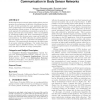Free Online Productivity Tools
i2Speak
i2Symbol
i2OCR
iTex2Img
iWeb2Print
iWeb2Shot
i2Type
iPdf2Split
iPdf2Merge
i2Bopomofo
i2Arabic
i2Style
i2Image
i2PDF
iLatex2Rtf
Sci2ools
129
click to vote
CODES
2010
IEEE
2010
IEEE
A greedy buffer allocation algorithm for power-aware communication in body sensor networks
Monitoring human movements using wireless sensory devices promises to revolutionize the delivery of healthcare services. In spite of their potentials for many application domains, power requirements and wearability have limited the commercialization of these systems. In this paper, we propose a novel approach for optimizing communication energy by reducing inter-node data transmissions. This is accomplished by introducing buffers that limit communication to short bursts, and therefore decrease power usage and simplify the communication. Our buffer allocation is a greedy algorithm that can operate both in a centralized and distributed architecture. We experimentally demonstrate the effectiveness of our power reduction techniques. Our results show that, compared with an unbuffered system, our system achieves more than 30% reduction in energy consumption. Categories and Subject Descriptors C.3 [Computer Systems Organization]: Special Purpose and Application-Based Systems--Real-time and e...
CODES 2010 | Power Reduction Techniques | Software Engineering | Systems | Wireless Sensory Devices |
| Added | 10 Feb 2011 |
| Updated | 10 Feb 2011 |
| Type | Journal |
| Year | 2010 |
| Where | CODES |
| Authors | Hassan Ghasemzadeh, Roozbeh Jafari |
Comments (0)

